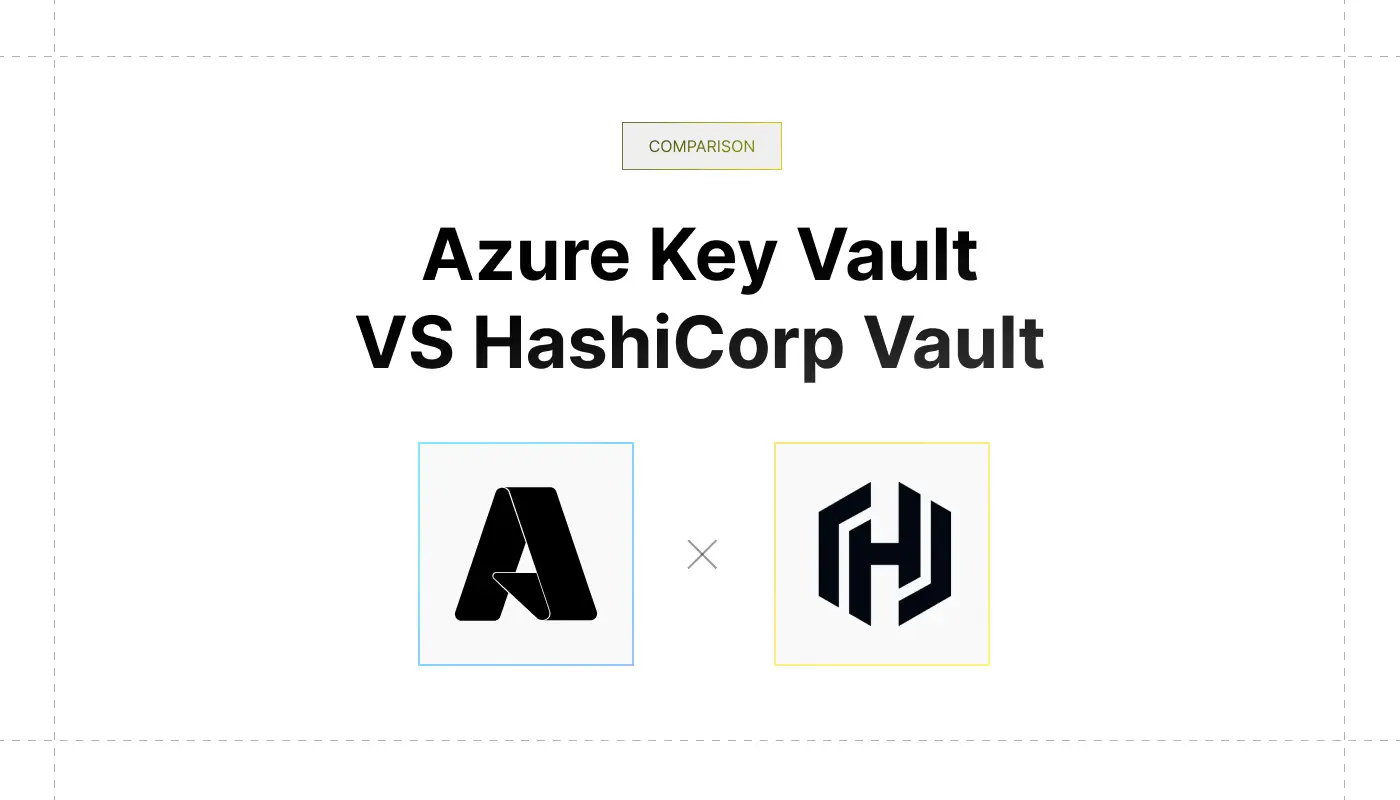
With companies like Mercedes Benz, Astrazeneca, and Samsung undergoing major credential leaks, secret management is a key concern for the majority of global enterprises.
Two prominent solutions in the realm of secrets management are Microsoft Azure Key Vault and HashiCorp Vault. Both platforms offer robust solutions for securing, managing, and monitoring access to secrets across various environments. However, their approaches, features, and suitability for different organizational needs can vary. This blog post aims to dissect and compare these two solutions to aid in making an informed decision.
In addition, the blog compares Azure and Vault to Infisical – the #1 open source secrets management platform for developers.
Overview
Azure Key Vault
Azure Key Vault is a cloud-based service from Microsoft Azure that securely stores and manages cryptographic keys, secrets, and certificates. It offers a secure and scalable solution to protect data and manage sensitive information, reducing the need for physical hardware security modules and simplifying encryption and access control in cloud applications. For a detailed understanding of Azure Key Vault's costs and whether it makes sense for your organization, see our complete pricing guide.
Hashicorp Vault
Hashicorp Vault, on the other hand, is a source-available (not open-source) tool for secrets management, encryption as a service, and privileged access management. It's designed to handle multiple backends, provides secure secret storage, and tightly controls access to secrets in dynamic, multi-cloud or on-premises environments. Here is a complete pricing guide for Hashicorp Vault.
Key Features Comparison
1. Secrets Storage and Management:
- Azure Key Vault: Cloud-based service designed for the secure storage and management of secrets, such as passwords and API keys, facilitating controlled access and encryption in cloud applications.
- HashiCorp Vault: Provides a centralized place to store and access secrets. It supports various storage backends and offers dynamic secrets, generating credentials on-the-fly which expire after a set time.
2. Access Control:
- Azure Key Vault: Provides robust access controls through Azure Active Directory, enabling fine-grained permissions for managing cryptographic keys, secrets, and certificates. However, the complexity of configuring and maintaining Azure Key Vault access policies, along with the reliance on Azure's ecosystem, can pose challenges for large organizations and those seeking more cloud-agnostic solutions.
- HashiCorp Vault: Vault’s access control model is significantly more powerful but requires careful planning and management to avoid potential issues. It features a flexible policies system and supports multiple authentication methods. In addition, it offers identity-based access, enabling policies to be defined based on individual client identities.
3. Integrations and Ecosystem:
- Azure Key Vault: Seamlessly integrated within the Microsoft Azure ecosystem, offering native support and easy integration with Azure services, enhancing security and management of cryptographic keys and secrets across applications. This deep integration streamlines workflows and security practices but may limit flexibility for organizations using non-Azure developer tools or operating in multi-cloud or hybrid cloud environments.
- HashiCorp Vault: Provides a rich set of APIs and a vast ecosystem of integrations, allowing it to fit into any part of the application lifecycle. Certain integrations are community-developed and not maintained by HashiCorp – making their quality less predictable.
4. Scalability and Performance:
- Azure Key Vault: Azure Key Vault is designed to scale automatically with the demand of cloud applications, ensuring high performance and availability for managing cryptographic keys and secrets, even under heavy load. However, its performance can be influenced by the chosen pricing tier and network latency, especially in scenarios requiring rapid access to secrets across global regions.
- HashiCorp Vault: Also scales well and is designed to handle high throughput, with support for replication and performance standbys to handle read-heavy workloads. It is worth noting that the replication architecture may be tedious to set up and comes with high maintenance overhead and occasional inconsistencies.
5. Audit and Compliance:
- Azure Key Vault: Azure Key Vault supports comprehensive audit and compliance requirements by providing detailed logging of access and operations on keys, secrets, and certificates, which can be integrated with Azure Monitor and Azure Log Analytics for real-time monitoring and analysis. This capability facilitates adherence to regulatory standards and helps organizations maintain a strong posture on security and compliance by enabling them to track and audit all operations conducted within the Key Vault.
- HashiCorp Vault: While HashiCorp Vault provides robust audit and compliance capabilities through detailed audit logging, managing these logs and integrating them with external systems can be complex and resource-intensive, potentially complicating compliance efforts for organizations without the necessary expertise or infrastructure.
6. User Experience and Ease of Use:
- Azure Key Vault: Key Vault`s user interface and operational complexity can pose significant challenges for those not deeply versed in Azure's services, potentially leading to a steep learning curve and operational inefficiencies for newcomers.
- HashiCorp Vault: The main problem with Vault still remains the difficulty of its implementation in the open source version, which is not significanly simpler for its expensive Vault Enterprise edition. Vault is mostly operatable through its API with its UI being largely limited in functionality.
7. Open Source Licensing and Self-hostability:
- Azure Key Vault: Proprietary service offered by Microsoft as part of its Azure cloud platform, and it does not come with an open source license or the option for self-hosting.
- HashiCorp Vault: Previously offered an open-source version under the Mozilla Public License 2.0. However, HashiCorp recently changed the license for future releases of its products, including Vault, to the Business Source License (BSL) v1.1. This license is not open source but rather source-available and allows for non-commercial use and commercial use under specific conditions, but restricts the use in competitive offerings. The change aims to give HashiCorp more control over the commercialization of its products. That being said, it is possible to self-host Vault on your own infrastructure – whether it is one of the public cloud providers on on-premises.
Another alternative: Infisical
Both Vault and Azure solve many problems of secret management, but introduce another important one – they can be extremely difficult to understand, implement, and maintain. Organizations can purchase the most secure tools, but engineers will find ways around those tools if they are not straightforward to use. As a result, organizations will not achieve the goal of enhancing their security posture and saving developer hours. To solve this, organizations should consider taking a look at Infisical – the open source secret management platform for developers. Here are some of its defining characteristics:
- Open source under the MIT license;
- Various hosting options: Cloud or On-prem;
- Great developer experience with the focus on the ease of integration without sacrificing any security;
- Industry-tested by Fortune 500 corporations and international governments;
- Tight Access Controls, Permissioning Workflows, and Comprehensive Audit Logging;
- Integrations with leading Developer, CICD, and Infrastructure tools;
- Support for Secret Rotation and Dynamic Secrets;
If any of this sounds interesting, you can talk to our team to learn more.

Conclusion
Both Azure Key Vault and Hashicorp Vault offer good solutions for managing secrets and sensitive data for certain use cases. Even though they have their own challenges, the choice between the two often boils down to specific organizational needs, infrastructure, and personal preference.
-
Azure Key Vault is a great option if you are heavily invested in the Azure ecosystem and need a managed service for secrets management. While its pricing model is relatively straightforward compared to Vault, costs can add up quickly with large numbers of keys or high transaction volumes. It is likely a better fit for younger companies, and you may run into certain challanges depending on how complex your infrastructure is.
-
On the other hand, if you're looking for a highly-customizable solution that integrates into a multi-cloud environment even if it comes with a certain maintenance overhead, Hashicorp Vault could be the way to go.
-
Finally, in case your organization is looking for a developer-friendly solution with low maintenance overhead that can be integrated seamlessly across all of your technology stack and systems – Infisical may be the right choice for you.
In the end, a thorough evaluation aligned with organizational security policies, compliance requirements, and infrastructure needs will guide you to the right choice. Both platforms, together with Infisical, have their strengths and can significantly bolster your secrets management practices and organization-wide security posture.

